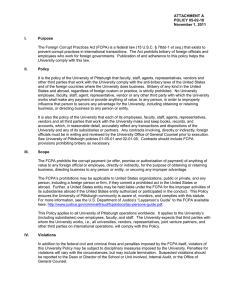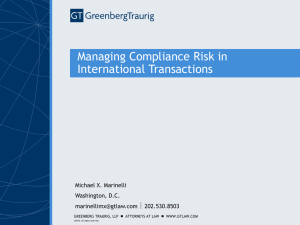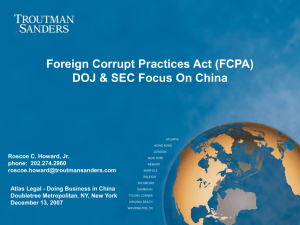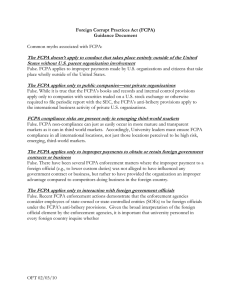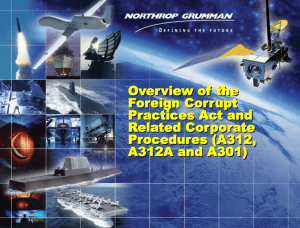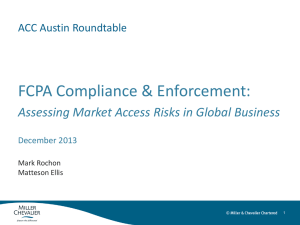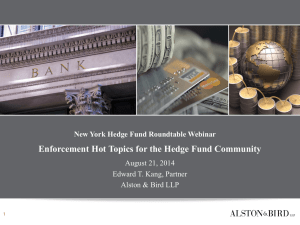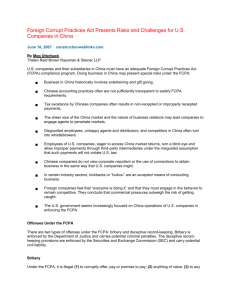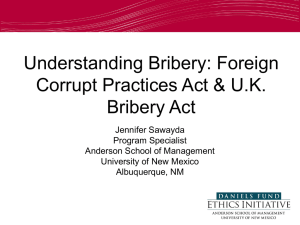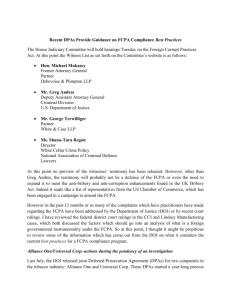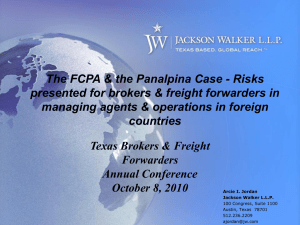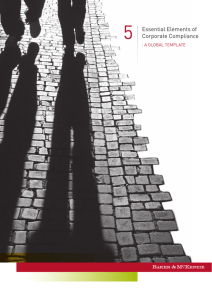FCPA for Roundtable - Oregon State Bar Corporate Counsel Section
advertisement
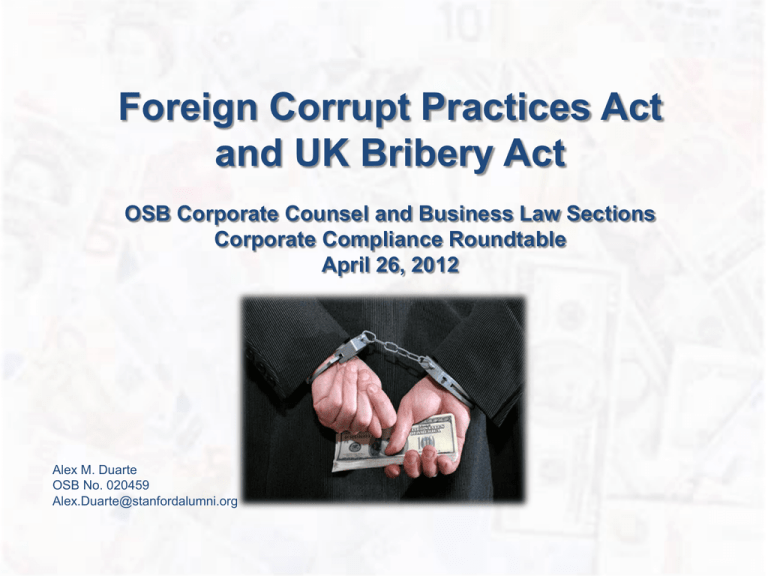
Foreign Corrupt Practices Act and UK Bribery Act OSB Corporate Counsel and Business Law Sections Corporate Compliance Roundtable April 26, 2012 Alex M. Duarte OSB No. 020459 Alex.Duarte@stanfordalumni.org Key Anti-Bribery/Anti-Corruption Laws US Foreign Corrupt Practices Act UK Bribery Act 2010 Most other countries have their own anticorruption laws What is the FCPA? FCPA (15 USC §§ 78dd-1, et seq.) generally prohibits • Giving or offering money or “anything of value” • To a foreign official (includes employees of State-owned entity) • To influence official or obtain improper advantage • To obtain or retain business FCPA also prohibits • Giving money/anything of value • To a third person • Knowing that it will be offered or given • To a foreign official • To obtain or retain business DOJ (Department of Justice) enforces this part of FCPA What is the FCPA? (cont.) “Anything of value” • Not just cash • Has a very broad interpretation by governmental enforcement authorities • Can include numerous improper benefits, including o Cash equivalents (such as gift cards) o Kickbacks o Gifts o Loans o Special favors What is the FCPA? (cont.) Anything of value (cont.) Specific examples o Extravagant gifts o Political donations/charitable contributions o Hiring of a third party or family member o Luxury goods o Lavish travel or entertainment o Fancy meals o Tickets to expensive sporting events (World Cup) What is the FCPA? (cont.) “Foreign Official” Broad interpretations, and includes: • Any governmental or public official o Any employee (even low-level clerk) • Employees of State-owned/State-run companies o Common in certain countries (e.g., China, India) o Common in certain industries (e.g., utilities, power-generation, oil and gas, telecom) What is the FCPA? (cont.) Third Parties • Applies to any party doing business with a company: o Sales agents o Distributors o Customers/suppliers/vendors o Consultants and Contractors o Other intermediaries • Pay special attention to independent sales agents (many bribery cases have involved sales agents) • Liability even if Company did not make bribe itself o If Company knew, or should have known, of bribery o No ostrich defense - “Willful blindness”/“head in sand” o Don’t ignore “red flags” What is the FCPA? (cont.) Narrow Exceptions and Defenses • Facilitating payments (“grease” payments) for “routine government action by a foreign official” (but be careful- gray area/“sticky wicket”) • Lawful in country - the payment is lawful under the written laws of the foreign country • Promotional and marketing activities and expenses o Expenses for promotion or demonstration of a product or service o Expenses in connection with the performance of a contract with a foreign government or agency o Example- reasonable travel expenses for official to tour facility: Must still be reasonable, not extravagant directly related to legitimate business purpose of product/contract FCPA - Accounting Provisions The FCPA requires a corporation to: Keep and maintain books, records and accounts that fairly and accurately reflect transactions Maintain an adequate system of internal accounting controls The SEC (Securities and Exchange Commission) enforces above Recent FCPA Accounting Violations • One recent example• $23M fine in 2010 alleged $3.6M bribes in U.N. “Oil for Food” program in Iraq • SEC found GE violated the FCPA: “GE failed to maintain adequate internal controls to detect and prevent these illicit payments, and it failed to properly record the true nature of the payments in its accounting records.” What is the FCPA? (cont.) Penalties Penalties can be severe (corporations/individuals) • Corporations- fines, penalties and settlements can include millions of dollars • Individuals- fines can include $100K/violation, and up to five years of imprisonment • Fines and settlements- US (DOJ) and other countries have collected billions of dollars in fines, penalties and settlements (more than $3 billion since 2009) Potential Fines/Imprisonment FINES US: Corporation = 2x profit Individual = $100K per violation UK: Unlimited Siemens $800M 2008 KBR/Halliburton $579M 2009 BAE $400M 2010 Technip SA $338M 2010 PRISON US: Up to 5 years/violation UK: Up to 10 years US Prosecutions are Increasing Department of Justice Securities and Exchange Commission 48 26 2 3 2004 7 5 7 8 2005 2006 26 18 20 20 13 14 2007 2008 2009 2010 Top 11 Corporate FCPA Settlements The past four years have seen the 11 largest FCPA settlements, totaling more than $3 billion from 11 companies Siemens (2008) KBR/Halliburton (2009) BAE (2010) ENI/Snamprogetti (2010) Technip (2010) JGC (2011) Daimler AG (2010) Alcatel-Lucent (2010) Deutsche Tel/Magyar (2011) Panalpina (2010) Johnson & Johnson (2011) $800 $579 $400 $365 $338 $218.80 $185 $137 $95 $82 $70 In Millions $0 $100 $200 $300 $400 $500 $600 $700 $800 $900 Costs of FCPA Investigations Companies are devoting significant resources (attorneys and accountant fees) associated with FCPA investigations (often much more than the amount of bribe) U.K. Bribery Act (2010) Broader than FCPA: • No public official requirement - prohibits any bribes, to anyone (i.e., private sector) • Applies to offenses committed in UK, and outside UK where person has a “close connection” with UK • No exceptions for “facilitating” payments or marketing and promotional activities or expenses • Unlimited fines possible; up to 10 years in prison • Adds crime for corporation unless it can show “adequate procedures in place to prevent bribery” COMMON BRIBERY RISK AREAS • Promotional and Marketing Expenses - must be reasonable and not extravagant, and related to business purpose • “Facilitating” (“grease”) payments - allowed by FCPA, but must be nominal amounts and for routine actions (gray area) • Travel- must be reasonable, not extravagant and be related to business purpose (e.g., tour of a manufacturing facility) • Gifts and Entertainment - prohibited to any public official; must be reasonable for private parties • Charitable Contributions • Political Donations and Lobbying Activities Bribery “Red Flags” Country- country known for corruption (“BRIC” countries) Agent and Governmental/Public Official Red Flags • Background/Structure - agent has questionable background or reputation, or shell company or other unusual structure • • • • Recommendations - public official recommends agent Objections to written contract Objections to compliance representations Close ties- agent and public official have close personal, family or business ties • Business interest in agent - public official has ownership interest in or business relationship with third-party agent • Agent not qualified/competent Bribery “Red Flags” (cont.) • Not want to disclose identity • Anonymity/lack of transparency • Suspicious statements - “don’t want to know,” “don’t ask” Compensation and Invoice Documentation Red Flags • Payment in cash or another country’s currency • Payment different from invoice • Other unusual payment arrangements • Fees/commissions excessive (exceed “going rate”) • Invoices- invoices are unusual, such as: o lack standard terms o do not reflect actual services rendered o have vague descriptions/“miscellaneous” charges Bribery Red Flags[keep this one?] Country and Political red flags Country is known for corruption Agent close ties with public official Public official recommends or requires use of certain agent Agent not qualified or competent Agent requests anonymity Agent’s questionable background Payment Request red flags Fees/commissions are excessive Agent requests cash or payment in another country’s currency Agent requests payment to someone other than the agent or to accounts in another country Invoice red flags Lack standard invoicing terms Do not reflect actual services rendered or are inconsistent with underlying agreement Contain vague descriptions of services rendered, or out-of-pocket expenses incurred “Miscellaneous” charges Consider above flags on a caseby-case basis using a totality of the circumstances approach Corruption Perceptions Index 2011 Corruption Perceptions Index 2011 1. New Zealand 69. Italy 8. Australia 73. Brazil 16. United Kingdom 75. China 19. Ireland 95. India 24. United States 100. Mexico 25. France 143. Russia 57. Czech Republic 182. Somalia Wal-Mart de Mexico Last Sunday- blockbuster article in the New York Times about a $24 million bribery scandal by Wal-Mart’s Mexican subsidiary • On-going bribes for years, throughout the country • Allegedly used attorney fixers (“gestores”) to pay off public officials to obtain licenses and permits to build new stores • Sham accounting- suspicious documentation and mysterious codes masquerading as “facilitating” payments • Scheme allegedly known by senior executives and in-house counsel, including current CEO, Chair, Vice Chair and CAO • Alleged intervention by senior executives to pressure auditors from conducting a full or aggressive investigation Wal-Mart de Mexico (cont.) • Investigation duties given to Mexico subsidiary GC- who was a target of the investigation! • Mexican sub GC conducted superficial “investigation” and promptly cleared all of wrong-doing (cover-up) • Wal-Mart failed to notify US or Mexican authorities until late 2011 (allegedly due to NYT investigating scandal) DOJ and SEC now investigating- this won’t be the last you have heard about Wal-Mart de Mexico and FCPA/anti-corruption Fines and penalties- possibly tens/hundreds of millions of dollars? Moral (learned from Watergate)- Cover-up is worse than the crime Take-aways for Corporate Counsel • Importance of Companies having strong FCPA/anticorruption policies and procedures • FCPA has been big focus by DOJ and SEC in the past 4-5 years- companies large and small • FCPA policies and procedures- key aspect of Company’s internal Ethics and Code of Conduct policies • Preventative measures and training are key • Focus on “red flags” and third parties to reduce risk (know your customers and business partners) • FCPA violations can lead to more than fines and penalties (prison, reputational damage, stock price, careers, etc.) • Zero tolerance corporate policy/culture for bribery and corruption of anyone, by anyone
